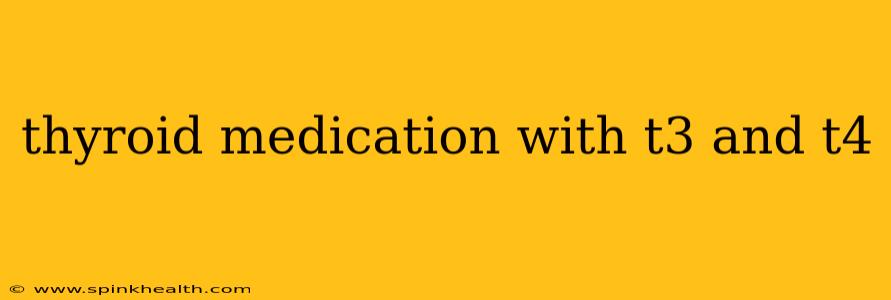The human body is a marvel of intricate systems, and at its heart, quite literally, lies the thyroid gland. This unassuming butterfly-shaped organ, nestled in the neck, plays a crucial role in regulating metabolism, growth, and development. When the thyroid falters, producing either too little or too much hormone, the consequences can be significant, impacting everything from energy levels to weight management. This is where thyroid medication, often containing a combination of T3 and T4, comes into play. Let's delve into the world of thyroid hormone replacement therapy, focusing on the synergy between these two crucial components.
Imagine your thyroid as a meticulously calibrated engine. T4 (thyroxine) and T3 (triiodothyronine) are its fuels – vital hormones that orchestrate countless bodily functions. While T4 acts as a precursor, slowly converting into the more active T3, T3 is the powerhouse, directly influencing metabolism and cellular activity. Many people with hypothyroidism (underactive thyroid) require a combination of both T4 and T3 to achieve optimal thyroid function.
Why is T4 the dominant hormone in most thyroid medication?
T4, while less active than T3, possesses a longer half-life. This means it remains in the bloodstream longer, providing a more stable and sustained release of thyroid hormone. The body then gradually converts T4 into T3 as needed. This gradual conversion ensures a more balanced and consistent hormonal profile throughout the day, avoiding the potential for dramatic fluctuations seen with T3 alone. This is the primary reason why many medications primarily contain T4.
What are the benefits of adding T3 to T4 medication?
For some individuals, despite adequate T4 levels, symptoms of hypothyroidism persist. This could be due to an impaired conversion of T4 to T3, or a condition known as T3 resistance. In these cases, adding a small amount of T3 to their T4 medication can significantly improve symptoms. The added T3 can provide a more immediate boost to metabolism and cellular activity, leading to a faster improvement in energy levels, mood, and weight management. However, it is crucial to understand that adding T3 requires careful monitoring and adjustment under the guidance of an endocrinologist.
What are the potential side effects of combining T3 and T4?
While the combination of T3 and T4 can be extremely beneficial for some, it also presents the possibility of side effects, particularly if the dosage isn't precisely calibrated. These side effects can mimic those of hyperthyroidism (overactive thyroid), including increased heart rate, anxiety, weight loss, and insomnia. Therefore, careful monitoring of dosage and close communication with your doctor are essential to ensure the treatment remains effective and safe.
Can I take T3 alone?
While some individuals may benefit from T3 alone in specific circumstances, it's generally not recommended as a standalone treatment for hypothyroidism. The shorter half-life of T3 means its effects are less predictable and may lead to significant fluctuations in hormone levels. This variability can cause discomfort and make it challenging to maintain consistent thyroid function. The combined approach of T4 and T3 usually offers better control and stability.
How is the dosage of T3 and T4 determined?
Determining the appropriate dosage of T3 and T4 is a personalized process. Your endocrinologist will consider various factors, including your age, weight, overall health, and the severity of your hypothyroidism. They'll likely perform blood tests to measure your TSH (thyroid-stimulating hormone), T3, and T4 levels. These tests help them gauge your thyroid function and fine-tune the dosage until you reach optimal levels and experience symptom relief. Regular monitoring is essential to adjust the medication as needed throughout the treatment process.
What if my symptoms aren't improving even with T3 and T4?
If you're taking a combination of T3 and T4 and still experiencing symptoms of hypothyroidism, it's crucial to communicate this with your endocrinologist. There could be other underlying medical conditions contributing to your symptoms, or the dosage might need further adjustment. Additional testing and a thorough assessment can identify the cause and help develop a more effective treatment plan. Never attempt to adjust your medication independently. Always consult your physician for any changes in medication.
Remember, embarking on thyroid medication is a journey best undertaken with the guidance of a healthcare professional. Understanding the roles of T3 and T4 and their potential synergistic effect is a crucial step in managing your thyroid health effectively. This information is for educational purposes only and should not be considered medical advice. Always consult your doctor or endocrinologist for personalized guidance and treatment.

